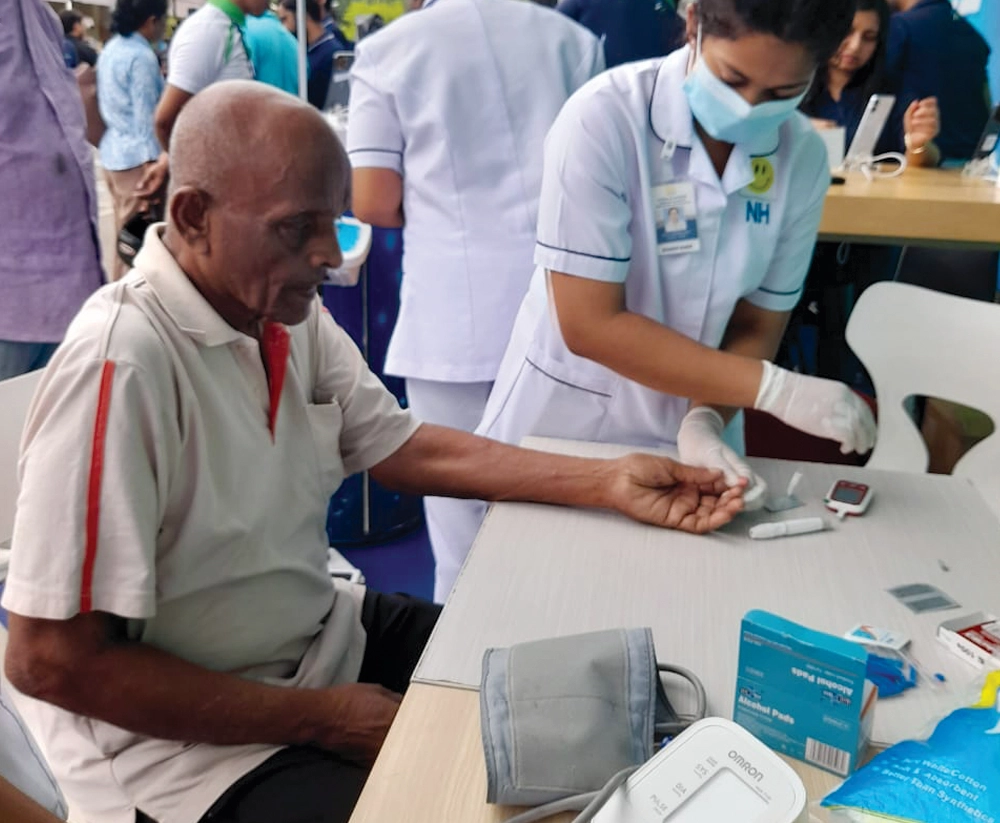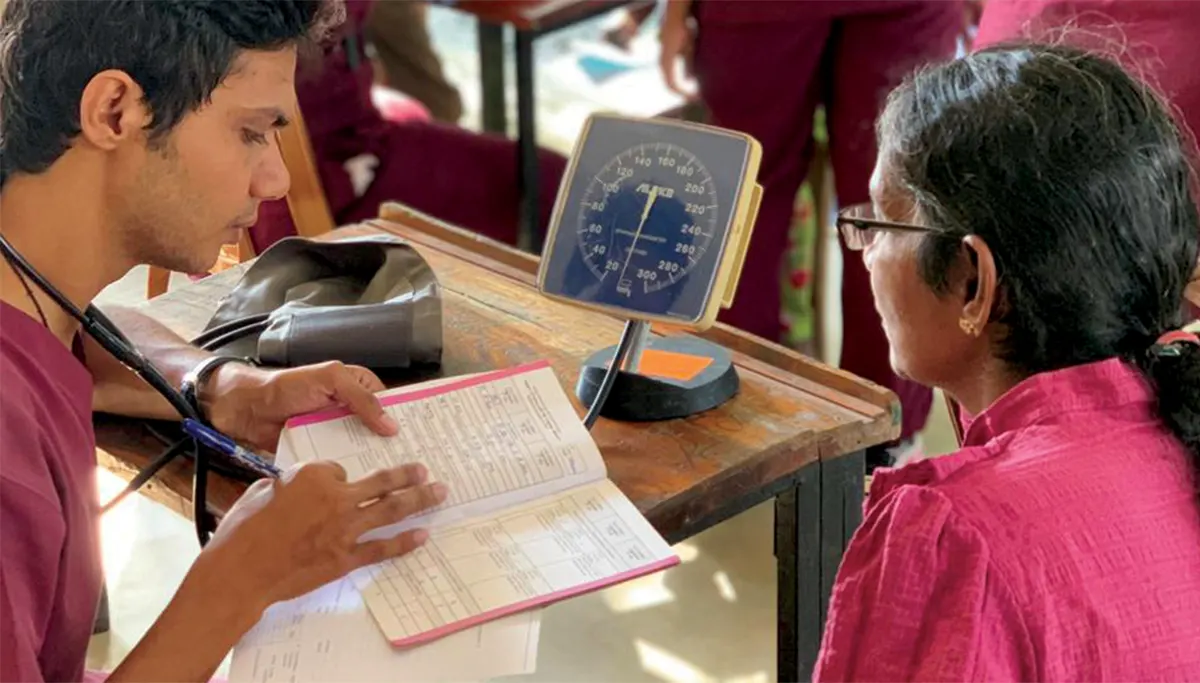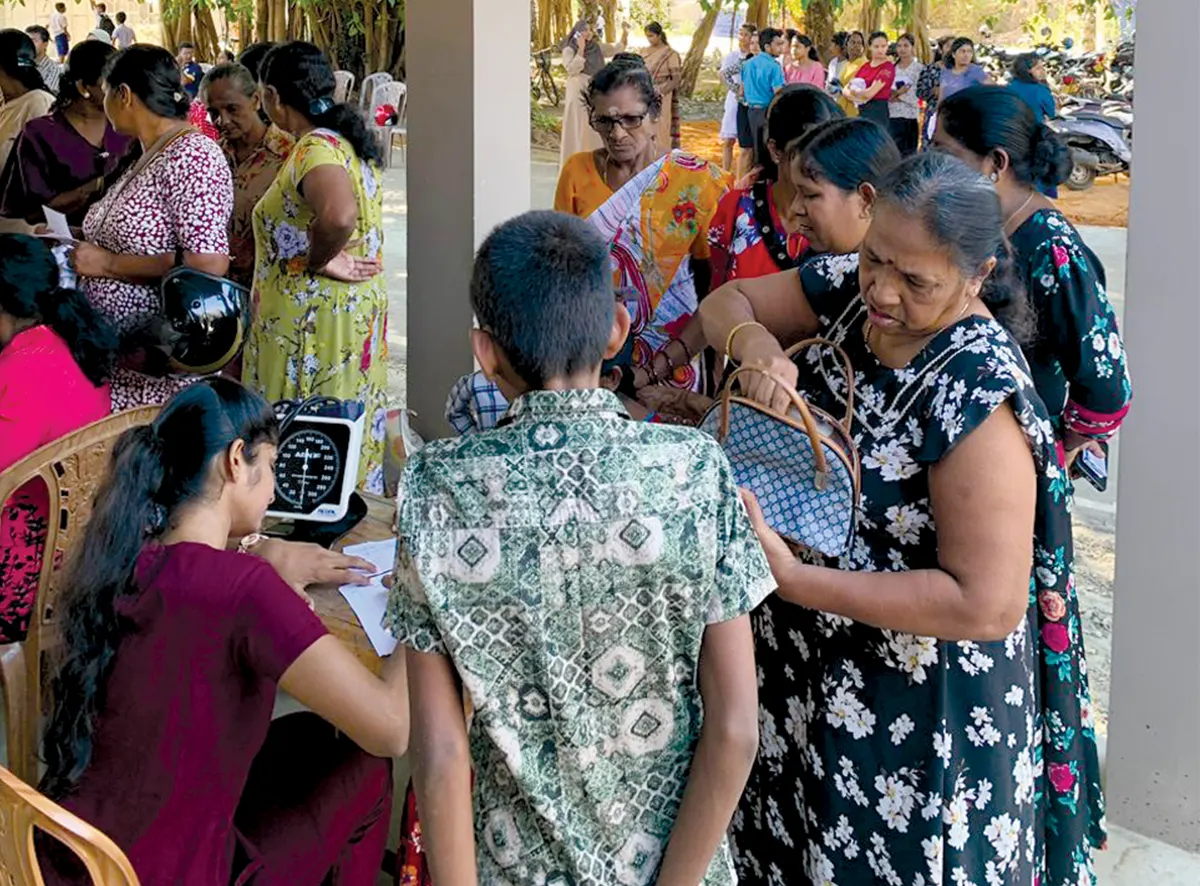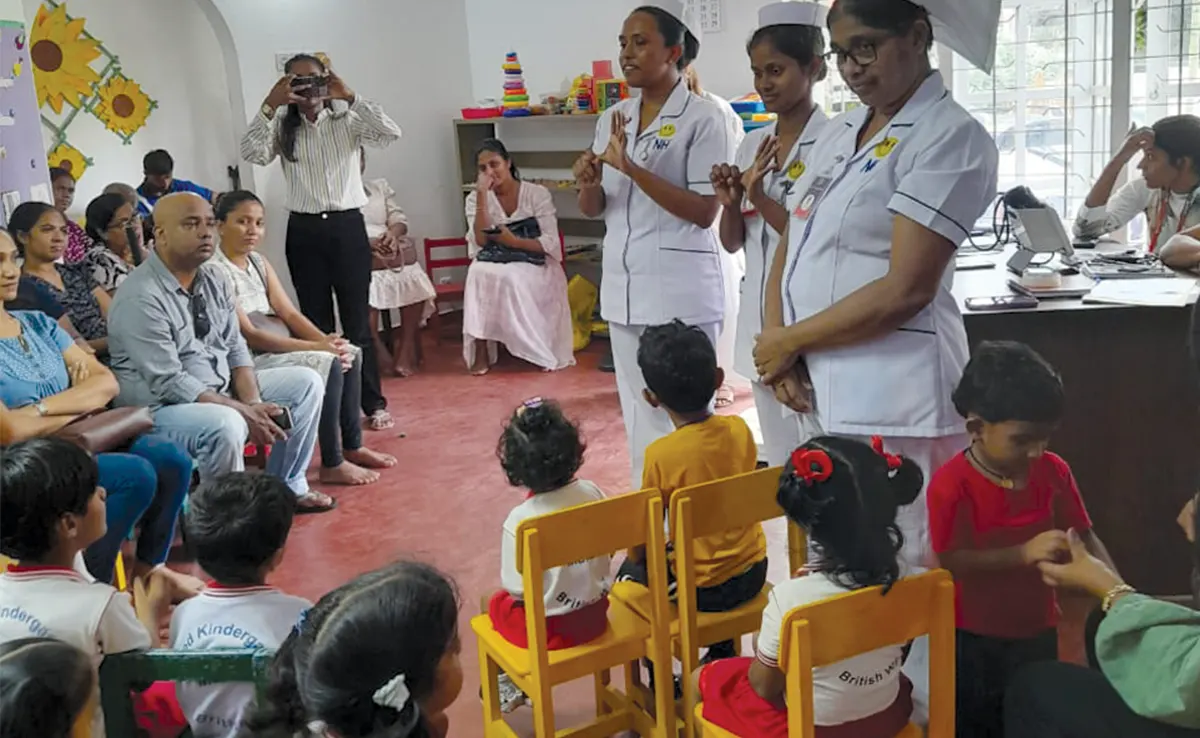At the moment, there are no entries available for display


Mindful of the fact that sustainability incorporates lasting growth in terms of our economic, social and economic impact, Nawaloka Hospitals PLC embeds these principles into our operations, governance, and growth strategy. We employ a holistic approach that integrate ethical leadership, climate resilience endeavours, and community outreach efforts in our sustainability journey.
Environmental Responsibility
In line with our commitment to environmental stewardship, Nawaloka Hospitals PLC consistently focuses on improvements in energy, water, and waste management across our facilities. In the year 2024/25, we ensured efficiency upgrades, compliance with national standards, and hospital-wide awareness to reduce our ecological footprint while safeguarding patient comfort and safety.
Energy Efficiency and Emission Reduction
The Hospital’s increased focus on smart energy usage facilitated the reduction of operational costs and environmental impact. We adopted energy-saving technologies, including motion-sensitive lighting and climate-optimised air conditioning systems as part of our energy efficiency and emission reduction commitment, as highlighted below:






Water Management
The nature of our clinical operations renders us inherently dependent on high volumes of water consumption. Mindful of this, we implemented several initiatives to conserve water while maintaining hygiene and infection control standards. Additionally, the Hospital carefully monitored water consumption and aligned with patient volume and bed occupancy. The key highlights of our water conservation efforts are presented below:



Waste Management and Hazard Mitigation
We have implemented a structured waste segregation and disposal framework that ensures full regulatory compliance while minimising risks to public health and the environment. Looking to streamline these efforts, we have set up an active Waste Management Committee that oversees segregation, storage, and audits, while also partnering with an external, licensed contractor to safely dispose of clinical waste. In the year, 2024-25, we maintained a positive track record of environmentally friendly waste management and hazard mitigation as presented below:


| 2020/21 |
2021/22 |
2022/23 |
2023/24 |
2024/25 | |
| Energy consumption (kWh) | 9,822,140 | 9,920,361 | 9,969,963 | 9,216,574 | 9,522,986 |
| Water consumption (m3) | 184,244 | 191,614 | 210,775 | 231,300 | 235,812 |
Environmental Governance and Compliance
Nawaloka’s environmental practices are guided by a central policy that sets clear sustainability targets and governs performance tracking. We maintain rigorous internal audit standards and performance monitoring to maintain our ongoing commitment to environmental governance and compliance.



Climate Preparedness
Climate volatility continues to intensify across Sri Lanka’s urban centres. Recognising this, we look to safeguard uninterrupted healthcare delivery through proactive climate resilience planning. We have identified that urban flooding and heatwaves are likely to cause international supply chain disruptions, which in turn pose risks to the continuity of our clinical operations. As such, our strategic responses focus on infrastructure adaptation, critical system redundancy, and supply continuity to ensure patient safety and operational excellence under all conditions.
We have made targeted investments in infrastructure to mitigate the effects of extreme weather and environmental unpredictability. These include adaptive HVAC systems, backup power redundancy, and inventory buffering for essential medical supplies. Our hospital’s contingency measures, coupled with robust planning protocols, allowed us to maintain uninterrupted service throughout the year, even during periods of adverse weather and logistical constraints.
The illustration below presents our climate preparedness initiatives and outcomes during the year under review:












Ethical Stewardship and Responsible Practice
Ethical stewardship forms the bedrock of our institutional integrity. We employ the fundamental “Do No Harm” approach in shaping our clinical, financial and social responses. Our ethical commitments span data protection, fair billing, medical safety, and equitable access, ensuring patient dignity is protected at every point of care.
In 2024/25, we continued to strengthen our systems for privacy, controlled substance handling, and incident reporting, while making healthcare more accessible through subsidies, waivers, and compassionate billing. We also upheld zero tolerance for billing fraud through real-time audit mechanisms and robust cross-functional verification protocols.
Our ethical stewardship and responsible practice commitment is strongly linked to patient well-being and clinical excellence as presented on pages 37 to 43 in this Report. The highlights below present a concise glimpse into our ethical stewardship endeavours:
Ethical Stewardship at Nawaloka Hospitals PLC
- Unique patient ID for privacy and traceability
- Controlled drug handling (trained staff and audits)
- Transparent billing with pre/post disclosure
- QR-based real-time patient feedback
- Root cause analysis for incident response
Inclusive Access
Equity remains an integral aspect of our social responsiveness. We proactively remove affordability barriers through targeted subsidies, public-private partnerships, and special support for vulnerable patients, as presented below:





Community Outreach
Our community outreach initiatives align with our social value creation agenda. We believe that community engagement is central to health equity, public trust, and preventive care. Our collaborations with the Ministry of Health, NGOs, corporates, and educational institutions allow us to address health literacy gaps, facilitate increased access to essential screening, and ultimately bring medical services closer to undeserved populations. In 2024/25, our outreach programmes touched thousands of lives across urban and rural Sri Lanka.

Outreach initiatives at a glance
We held a Medical Camp in Baticaloa, in collaboration with a leading University to provide much-needed healthcare access to the local community. The programme offered free screenings such as ECG, blood test, Medical examination along with free medications. The event drew an excellent response from the public, underlining the importance of medical outreach in underserved regions.
The Medical Camp held in Baththaramulla in partnership with Little Preschool, focused on the health and wellbeing of children and their families. The camp featured dental check-ups, Medical examination, and health awareness programmes. The initiative, supported entirely by Nawaloka Hospitals PLC, highlighted the Company’s commitment to building healthier futures for younger generations.
In collaboration with Mobitel, we hosted a Medical Camp in Diyatha to promote accessible healthcare for the community. Free screenings such as random blood sugar (RBS), BMI, and blood pressure were provided, along with essential medications. The event not only catered to medical needs but also emphasised the value of preventive healthcare and wellbeing.
The Medical Camp held in partnership with CCCPDD in Rajagiriya, offered vital health services to residents. The programme included screenings for blood tests and medical examination while also distributing free medications. The initiative witnessed strong participation and reinforced Nawaloka’s role in advancing community health across Sri Lanka.



Nurturing Patient Relationships
Our engagement with patients is designed in a manner to foster empathy, trust and continuity of care. We employ digital tools, compassionate care, and multilingual communication to consistently enhance care. The Clinical Excellence and Patient Care chapter of this Report presents more insights into our patient care endeavours. The highlights below provide a glimpse into the key aspects of our efforts to improve patient care.
Patient engagement highlights
- Multilingual care assistants enhance inclusivity and clarity
-
Real-time feedback via QR codes with follow-through by
unit heads - Patient-centred events, including Baby Day celebrations, fertility reunions, and dialysis patient milestones
Health Literacy and Preventive Action Promotion
Nawaloka Hospitals PLC actively bridges health literacy gaps through education programmes across multiple platforms, formats, and languages, as presented below:
Health education initiatives
- Community seminars and webinars on chronic diseases
- Social media campaigns conducted in partnership with influencers
- Educational materials published in Sinhala, Tamil, and English
- Awareness drives conducted on National Health Days
Nurturing Partnerships
We maintain long-standing collaborations with external stakeholders to extend our social impact. From government regulators to academic institutions, our ecosystem approach ensures alignment, compliance, and innovation.
Collaborative contributions
- Joint clinical research in oncology, cardiology, and fertility
- Speaker sessions and training with Sri Lanka Medical Council, Tertiary and Vocational Education Commission, and universities
- Strategic insurer partnerships for accessible cashless care
Additionally, we maintain formal performance agreements with
vendors (SLAs) and regularly audit their compliance to ensure
that all medical supplies and services meet our safety,
quality,
and ethical standards.
Governance and Regulatory Alignment
We intentionally align with evolving national and international regulations to ensure that patient safety, data privacy, and clinical integrity remain uncompromised. During the year under review, we strengthened internal controls and digital infrastructure to meet emerging mandates around infection control, hazardous waste handling, e-prescriptions, and insurance documentation. Our Quality Assurance Department (QAD) played a pivotal role in institutionalising audit-readiness, standardisation, and transparency.
The key aspects of our governance commitment are as follows:






Anti-fraud Safeguards
We employ a billing system that facilitate transparency, traceability and accountability. The billing platform is integrated with the hospital-wide ERP system to enable the provision of real-time audit trails and automated alerts that flag inconsistencies, duplications, or unusual billing patterns. This comprehensive system ensures that every invoice is thoroughly reviewed, transparent, and defensible, as presented below.
Ethical billing and fraud prevention system
- Integrated billing with real-time audit trails
- Pre-discharge verification by clinical and finance teams
- Automated alerts for billing anomalies
- Randomised audits–consultants, pharmacy, diagnostics
- ISO 9001:2015 billing process certification
There were no significant fraud cases reported during the year under review, and the Hospital addressed minor discrepancies in a prompt manner through internal review and corrective action, without any adverse impact on stakeholders or financial integrity.
Adapting to Regulatory Change
Our comprehensive governance model incorporates regulatory foresight into strategic planning. As such, we prepare for policy shifts in advance to minimise disruptions and ensure compliance. In line with recent regulatory changes, we have accelerated our transition to digital record-keeping, enhanced our procedural discipline, and reinforced the importance of transparency.
Strategic responses to regulatory shifts
- Rapid adoption of e-prescription standards and data privacy protocols
- Strengthened documentation for insurance claims and clinical audits
- Increased internal compliance training and certification programmes
- Transparent billing disclosure frameworks for patient trust
Recognising that Sri Lanka is gearing towards increased public-private integration in healthcare, we remain well-prepared to respond to the transition in a prudent and beneficial manner. We have already equipped ourselves with the necessary accreditations and systems to facilitate anticipated policy shifts such as the expansion of government-sponsored insurance schemes, a national emphasis on universal health coverage (UHC), and mandatory clinical accreditation for private hospitals.

In the near future, we will maintain our approach towards advancing a healthcare model that is sustainable, inclusive, and future-ready. To this end, we wish to prioritise environmental stewardship through investments in energy-efficient technologies, smart water management, and green infrastructure. Our ethical governance frameworks will evolve in line with emerging regulatory expectations, ensuring transparency, compliance, and accountability. Moreover, we will expand our community health initiatives, strengthen digital health capabilities and nurture partnerships to achieve mutual progress.


